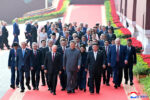Petar Petković, Director of the Office for Kosovo and Metohija, met today with Dominika Krois, the representative of the UN Secretary-General and Head of the UN Office in Belgrade, to discuss the upcoming UNMIK report, which will be the subject of tomorrow’s UN Security Council meeting.
In his discussion, Petković emphasized his narrative that Pristina’s actions continually undermine the Serb minority in Kosovo. He framed these actions as part of a broader effort by the Kosovo government to jeopardize the survival of Serbs within the region. Petković claimed that Pristina‘s one-sided and unlawful measures create terror and daily harassment for the Serb population, attempting to shift blame toward the Pristina government for the difficulties faced by Serbs.
He particularly focused on the recent arrest of Serb pilgrims from central Serbia, presenting these arrests as part of a deliberate strategy by Pristina to escalate tensions. He described the detainment of 16 Serbs over the weekend, who were attempting to visit Serbian religious sites ahead of the Orthodox feast of Annunciation, as an example of physical and legal violence aimed at suppressing religious freedoms. This narrative plays into Petković’s broader strategy of portraying Pristina’s actions as part of an ongoing persecution of the Serb minority in Kosovo.
Petković also seized the opportunity to criticize the Kosovo regime, accusing them of not fulfilling their obligations under the Brussels Dialogue, particularly the non-establishment of the Community of Serb Municipalities, which has been delayed for over a decade. His rhetoric paints the Kosovo government as consistently failing to honor international agreements and undermining the rights of the Serb minority.
In his remarks, Petković underscored that the oppression of Serbs is visible at every level of society in Kosovo. He reaffirmed Belgrade’s commitment to maintaining peace and stability in the region while highlighting adherence to international law and norms, particularly UN Security Council Resolution 1244 and the Brussels Agreement.
Petković’s narrative here is clear: by framing every setback and every action by Serbs that undermines Kosovo’s laws as Pristina’s fault, he pushes the idea that the Kosovo government is responsible for the suffering of the Serb minority. This rhetoric is designed to reinforce the propaganda that Pristina’s actions are leading to the persecution and eventual endangerment of the Serb community in Kosovo.
Concluding the discussion, Petković stressed the critical importance of UN support for Serbia’s position, which he argues is in line with international law regarding the status of Kosovo and Metohija, as outlined in UN Security Council Resolution 1244.







